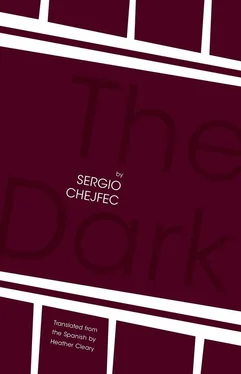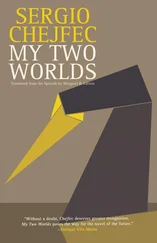Delia was worried that a car might splash mud on her skirt, though it was obvious that it would be days before a car passed through there. That street typically didn’t see traffic for weeks at a time; the tracks left by the vehicles gradually wore away, leaving behind shallow grooves where water collected, a record of the infrequent transit. We got to the house where Delia was supposed to return the skirt, isolated in the middle of what was theoretically a block, though it had no visible borders. The lots were marked by wire, dilapidated fences, or piles of stones and broken cinderblocks meant to suggest walls. There were no other structures, though I have a memory of walking along a corridor. There were no trees, either, just a few prickly shrubs and a bit of grass that grew precariously between them. The narrow, winding path was a rift worn by footsteps headed toward the house, which rose from the middle of the vast lot as though it were the center of the universe. As we walked, I thought about the night and, obviously, the thistle barrens, remarking to myself that differences mean less in the dark. Creatures of the light, humans need to adjust themselves to the night. The little path that led to the house was like one you might find in a forest, but there were no trees to be seen; it seemed extravagant in its simplicity, gratuitous in that it crossed nothing worth crossing. The owner of the skirt, who needed it that night, was waiting at the other end. The house was a hovel; in this, too, it resembled the thistle barrens. Delia opened the door without knocking or saying a word, and we stepped into a large, empty room. Dirt floors, rickety furniture, scattered appliances spotted with rust that was a deeper red than the ground. I won’t elaborate on the scene; I’ll add only that the windows were holes with sharp and irregular borders punched out of the walls, the kind you see in a poorly cut piece of sheet metal. My mind turned to the house, the neighborhood, to the poor sort of poetry that emerged from them; it was a scene that at first glance appeared weak, worn, on the verge of collapse. At one point, Delia stepped out to get changed. She came back in an old pair of pants, which I recognized, with the skirt tucked under her arm. She wasn’t gone long, no longer than it would take anyone to take off a skirt and put on a pair of pants, but it was long enough for me to think that the house — and not just the house, but the whole area — lacked both a past and a future. I could see traces of the labor of man, of the distracted signs of routine, the growth of a community, and so on; still, these were the marks of an invisible labor as accidental as that of nature. People working diligently, like ants, without a clear purpose and at the mercy of chance…
When Delia’s friend stepped out a little while later to try on the skirt, or simply to put it on, I wondered whether we didn’t pass through this world as anonymous beings, driven by a force at once innocent, merciless, and brutal. Delia felt protected from this power and, thanks to her condition — as a woman and a worker — resisted its influence. I have often thought that it is workers, with their bodies and the force they exert at the expense of their own energy, who atone for our indifference toward the world; that first, foremost, and in a literal sense, they pay out in labor what they receive as wages — an amount never equal to the true value of their efforts — but also that they pay for that which has no price, that is, for the infinite debt racked up by humanity. I was familiar with the operations whereby Delia’s friend would take off her clothes and put on the skirt: universal maneuvers that, in this particular case, were meant to confirm that it still looked good on her, as they say. The friend was out there somewhere, barely protected from prying eyes by the walls of the shack, or in the narrow bathroom, where the absence of light could be misleading: mistaking darkness for size, one ended up banging one’s feet and elbows against the walls. The kitchen was in one corner of the house; within its limited radius, a dense concentration of objects alluded to constant and, though it may seem contradictory, discontinuous actions. Delia was silent; she seemed to be thinking only of the imminent return of her friend. This was not exactly a thought, but it would be excessive to call it a premonition. We were taking part in one of the millions of micro-scenes that everyone enacts, all the time. The movement of the air could be heard, punctuated occasionally by drafts that whistled through the walls when the breeze picked up. At that moment there was little to say, so we didn’t speak for a while. In one corner, a gas burner rested unstably on the cylinder that fed it, surrounded by a jumble of pots, pans, and jugs, each set in the exact spot dictated by its use; this space was the origin of the invisible thread that tied the home together. It was palpable: the heat that warmed milk for the little ones, food for the adults, and so on, extended throughout the home and the time that existed within it, leaving its indelible mark. It was the presence that, for example, would allow the blind child to know that this was the interior of his own home, where his family lived. The rest of the dwelling was in shadow, and though the darkness was similar to that of the kitchen, everything in it was harder to see, more confused; the tangle of blankets, mattresses and pieces of foam rubber thrown together at absurd angles, like fallen dominos, belonged — or seemed to follow — to a logic that differed from, or contradicted, that of the kitchen. Whereas the kitchen signified a concentrating force, the rest of the house suggested a force of diffusion. It was there that dreams and desires went about their work, the space, even, in which bodies tried to escape themselves. At that instant, the two orders stood at bay, coexisting in an unconditional peace; this was the resonance of the moment. One could picture two sleeping armies unaware of their own weakness, their own narcissism and, most of all, their respective opponents.
I’d had nothing to say earlier, either, when Delia went to take off the skirt and I found myself alone with her friend. She was almost certainly waiting for a platitude, some incidental remark (even if nothing I said could be described as such), but I felt that the person who united us, Delia, was also the line that divided us, a barrier that could not be crossed. The walls were more articulate: the corner where the kitchen stood, as dark and cluttered as a shrine, said more than the distracted silence of Delia’s friend. It was into the hands of this transparent being that Delia would deposit that most delicate and flattering of skirts, I thought; the article of clothing that made her even more unique, that made her stand out to me as my chosen one and made the strongest case for the natural quality of her beauty. This could be understood as another of the paradoxes imposed on us by the notion of property: things don’t always belong to the right person; aside from those who have very little, most people don’t feel they have enough. They always want more, or different, things. I’ve read many novels that turn a blind eye toward property; characters come and go, or stay, forget one another, carry on. The same goes for actions. But this omission of property is a mistake, because the universe built around it is taken for granted as natural. This might have been a good topic for breaking the silence with Delia’s friend, but I missed that opportunity as well. I have forgotten her name but still recall the image of her fingers playing with the hem of the shirt she wore that afternoon. It was green with little pictures of dried fruits, walnuts, chestnuts, and so on printed on it. When its owner’s fingers closed around the fruits as though naïvely trying to pick them, they revealed the unexpected, though logical, justification of the pattern.
Читать дальше












